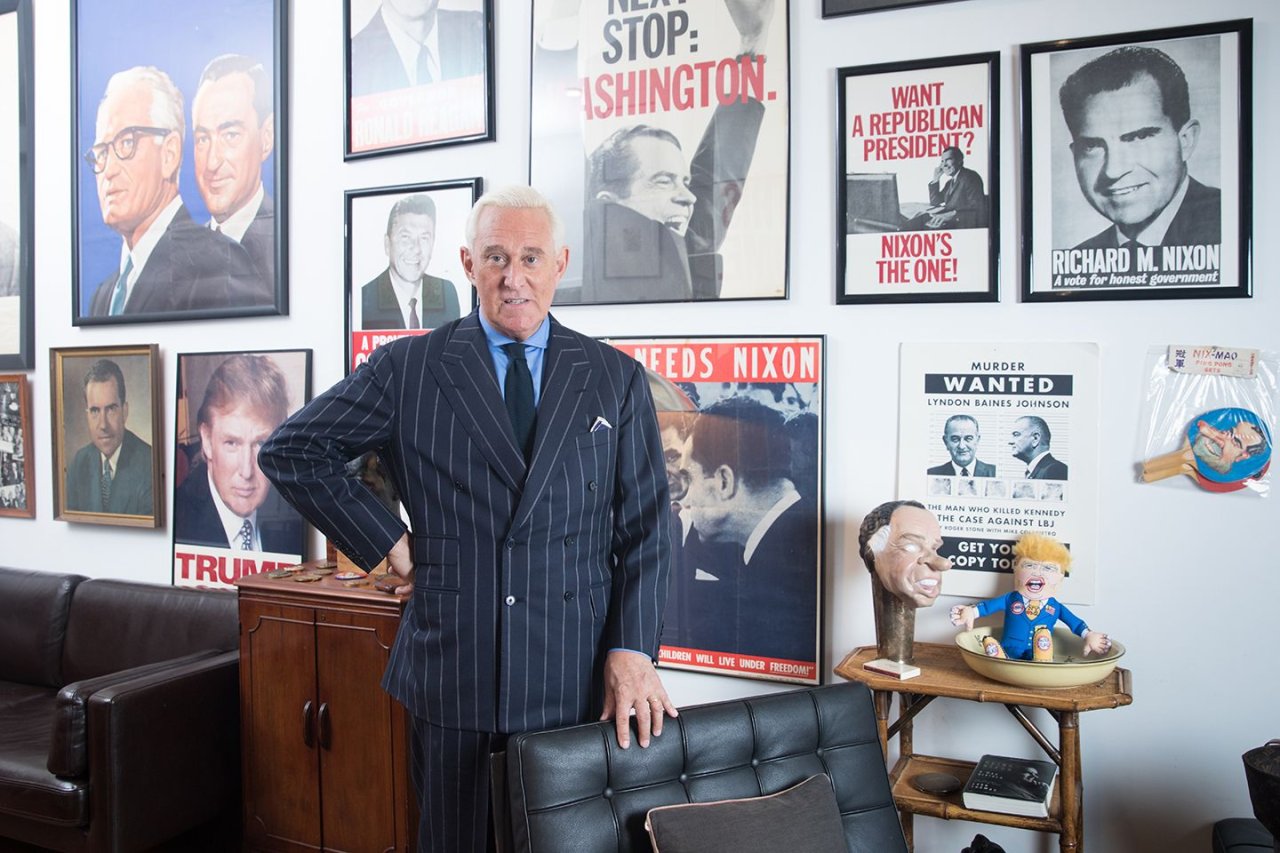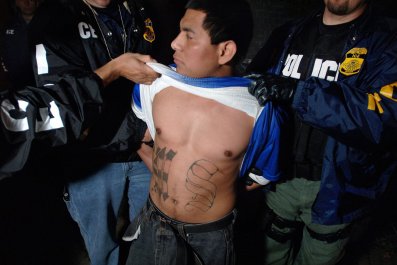The world is having a Roger Stone moment. I know this because Stone tells me so. "We live in the age of Stone," he says, in the lobby of SiriusXM's midtown New York office building. He repeats the line in an Uber uptown to his Harlem apartment and once more while he slurps down a martini.
It's a moment for sure. What kind of moment depends on whom you ask. The right-wing political consultant and lobbyist has been instrumental in the rise of Donald Trump. The two met during Ronald Reagan's 1980 presidential campaign, and Stone would go on to advise the New York real estate mogul—formally and informally—on his casino deals and during Trump's failed run for president in 2000.
Still, it's been an on-again-off-again relationship, with Trump relying on Stone one minute and turning on him the next. In pot-calling-the-kettle-black fashion, Trump said in a 2008 New Yorker profile: Roger is always "taking credit for things he never did." Trump ultimately fired Stone during the 2016 campaign. The statement of explanation at the time: "[Stone] has had a number of articles about him recently and Mr. Trump wants to keep the focus of the campaign on how to Make America Great Again." Stone says he quit.
One dubious distinction he can certainly take credit for: pioneering the art of influence peddling, back in the '80s, when he and Paul Manafort co-founded the lobbying firm Black, Manafort, Stone and Kelly. The headline for a 1985 New Republic cover story on Stone says it all: "State-of-the-Art Washington Sleazeball."
A new generation discovered him via the lively 2017 Netflix documentary Get Me Roger Stone , which captured the dark genius of branding in all his reprehensible glory. Among other things, he has a portrait of Richard Nixon tattooed to his back. (Once called one of Nixon's "dirty tricksters," Stone says he did nothing illegal during Watergate.) In May, he released his sixth book, Stone's Rules: How to Win at Politics, Business, and Style —and, really, why not capitalize on all his new fans and foes? The 140 rules include advice like "Don't hide your scars, they make you who you are…but don't fight the last war, either," and "Never ride in a white limousine." Stone is equally serious about both.
The bigger news, of course, is that Stone is now bracing for an indictment by special counsel Robert Mueller. Of particular interest is his alleged relationship with the Russian hacker Guccifer 2.0, who stole emails from the Democratic National Committee. But even as the investigation homes in on him—Mueller has begun interviewing his close associates (like former social media guru Jason Sullivan)—Stone is resolute about one thing: He won't flip on Trump.
But whatever. He's more famous than ever! During our time together, on a May afternoon in New York City, people stop him on the street, and some take discreet photos as he passes. "The documentary changed my life exponentially," he tells me. "I'm getting a greater level of my well-deserved recognition. I cannot be anonymous anymore, even when I try to be."
Such recognition has, in his words, "its aspects," and notoriety is perhaps a better description than popularity. "When you're having dinner with your children and grandchildren on Sunday at an Italian restaurant, and someone comes and shouts, 'You motherfucker,' it's not great," he admits. Last year, two women came up to him during a dinner in Harlem and told him to "burn in hell." He dismisses such haters as "Upper West Side Trotskyites." Still, every public interaction I witnessed (and there were a few) was relatively pleasant. "Things aren't as bad now as they were last year," he says.
Earlier, when I arrived at Stone's apartment, shared with his second wife, Nydia Bertran, he was wearing a Hugh Hefner–style smoking jacket and slippers. Inside, it's floor-to-ceiling Nixon and Reagan memorabilia. During a short tour of the place, he opens his bedroom door and tells me to look around, "just so you can see there are no Russians hiding in here."
Over the course of four hours, as I accompany him to various appointments, we naturally discuss the Mueller investigation (though at one point, en route to SiriusXM, he says he'll throw me out of the car if I ask one more question about it). Stone considers the scrutiny "logical" since he worked for Trump for 30 years, and because, as he puts it, he's a showman who exaggerates aspects of his life, and that gets him into trouble. "I'm speaking to 300 screaming Republicans and saying I've communicated to [Julian] Assange through a back channel. I'm dramatizing it," says Stone, who claims never to have met the WikiLeaks founder. (A subsequent investigation by The Wall Street Journal found that Stone asked an acquaintance to contact Assange about incriminating Clinton emails, but never received them). "But dramatization is not inaccuracy. It's just dramatization. The point is, people like dirty laundry. They like it. They're entertained by it."
Even his clothing is performative. His preferred outfits are Gatsby-esque: double-breasted suits and straw boaters, suggesting an easy-mannered dandy. But he often works 12-hour days, and he feels the stress of them. Before we leave his apartment for Sirius, he changes into a suit and his signature round black sunglasses. He's often seen puffing on an extra-long cigarette holder, like Noël Coward or the Penguin. "Today, would I have preferred to wear jeans and a tweed jacket?" he says. "Yeah, but then I wouldn't be Roger Stone."
When I ask if he's heard from Trump recently, Stone says no. "I'm pretty sure his lawyers have urged him not to talk to me." But, he insists, "mutual friends have told me, 'I was with the president the other night, and he wanted you to know he was asking about you and wishes you well.' So I know I'm on his good list."
He continues to believe that Trump had no personal involvement with Russians or their operatives, if only because of the president's management style. Stone says one guy who worked on Trump's campaign told him that "it was so fucked up, they couldn't have colluded if they wanted to. They couldn't get anything done.'"
After he threatens to kick me out of the car, I move on, to Stormy Daniels. "Are you asking me if Trump had sex with Stormy Daniels? Absolutely, that's my opinion," he says. "First of all, she's his type. Look at his wives. He likes tall, busty women."
At the same time, Stone doesn't get Rudy Giuliani's insistence that paying her off wasn't political. Otherwise, why get it wrapped up before the election? "It doesn't make sense to me," says Stone, who sees a possible federal election law violation: "The reimbursement thing has been problematic."
Spending time with Stone is vertiginous. We change locations quickly, with random people appearing and disappearing without explanation. At one point, a baby—his godson, I later learn—briefly shows up in his arms: "This is going to be our next president," Stone coos, before he's swept away by his mother. "I'm training him."
The first lesson might be: Presentation is paramount, substance optional. Stone's perfect candidate? Libertarian Rand Paul "in a different body. He's just not a candidate for the television age. He looks like Harpo Marx."
In Trump, he found all the elements in one swaggering package: "someone who is telegenic, persuasive, articulate, somebody who is clean and very, very, very, very rich." Unfortunately, says Stone, the president has "surrounded himself with war hawks and neocons. Trump admires their uniforms and likes their crisp efficiency, but I'm not sure he understands that they're not bending to his policies." Adding more men in Afghanistan is "not what the president got elected on," he says. "That is not Trumpism."
Stone is particularly upset about the confirmation of Gina Haspel—who oversaw waterboarding interrogation in Thailand—as CIA director. "At heart, Trump is an anti-interventionist," he says, "but he has this thing about torture. He thinks it signifies toughness. Haspel really does represent the deep state, and that's concerning to me."
If he had to predict, Trump will run again in 2020. But if the economy is booming, or he gets a reasonable deal with North Korea, or a peace agreement in the Middle East, "he also has every right to say, 'Well, folks, I made America great again. Now, I'm going out to the golf course.'"
A serious impeachment threat might be another deterrent, says Stone, even if Trump overcame it. "I could see him say, 'OK, I'll see you around.' Why does he need the grief, given everything he's accomplishing?"
He was perplexed by Trump signing the congressional $1.3 trillion omnibus spending bill into law and somehow surmises it was based on the threat of impeachment. How else to explain the increase in defense spending, "which is off the charts in the budget," says Stone. "Perhaps he signed because he thought he was getting the allegiance of the military if there was some kind of showdown."
I ask him to clarify. "If there is an illegal attempt to remove the president," he says, "you're going to have a civil war in this country." Meaning actual violence? "There's white-hot hatred for Trump," Stone answers, "and there is white-hot opposition to an attempt to [re]move him. Anything that is judged to be doctored or cooked up, it's not going to go well."
Who, then, will fire the first shot in this civil war? "Who[ever] wins the House," he says.
On that note, it's time for martinis. We've returned to the apartment, and Stone mixes up a batch of what he calls the Silver Bullet, based on a recipe he got from Nixon. He's made one small change: Russian vodka instead of Tanqueray gin. It's a little too on the nose, but that's Roger Stone for you.











